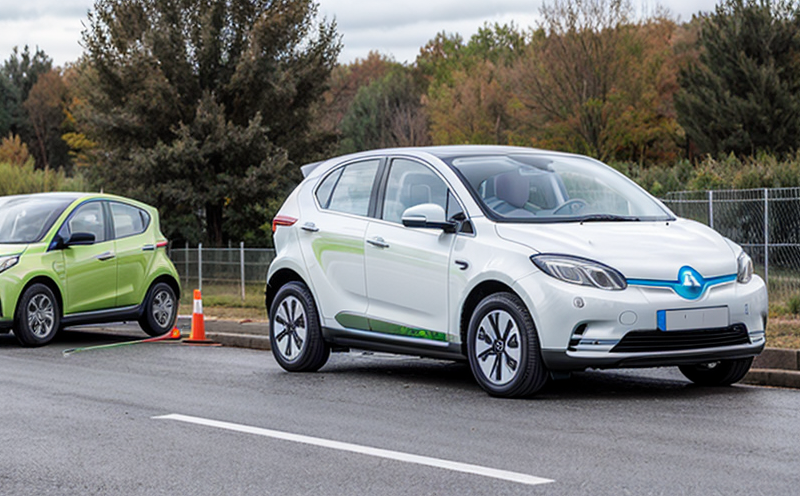IEC 62932-2-1 EV Hybrid Flow Battery Testing
The International Electrotechnical Commission (IEC) standard IEC 62932-2-1 is specifically designed to ensure the reliability, safety, and performance of electric vehicle (EV) hybrid flow batteries. This standard provides a comprehensive framework for testing these batteries under various operational conditions to validate their compliance with stringent quality and safety requirements.
Hybrid flow batteries are a promising technology in e-mobility and renewable energy storage due to their ability to store large amounts of energy efficiently. The IEC 62932-2-1 standard mandates rigorous tests that evaluate the structural integrity, thermal stability, electrical performance, and durability of these batteries over extended periods. This ensures that EVs equipped with such batteries can operate safely and reliably under real-world conditions.
The testing process involves several key stages. Initially, the battery is subjected to a series of preconditioning cycles to simulate typical use scenarios in an EV. These cycles test the battery's ability to withstand repeated charging and discharging processes without degradation. Subsequent tests focus on evaluating the battery’s performance under extreme temperatures, varying charge rates, and mechanical stress.
The IEC 62932-2-1 standard also mandates testing for specific parameters critical to the safe operation of hybrid flow batteries in EVs. These include impedance measurement, internal resistance determination, and capacity retention tests. Impedance and internal resistance are crucial indicators of a battery’s health, while capacity retention measures how well the battery retains its original energy storage capacity over time.
For quality managers and compliance officers, ensuring that their products meet these stringent standards is essential for market entry and regulatory compliance. The standard also provides guidelines for reporting test results in a standardized format, which aids in consistent evaluation across different manufacturers and regions.
In addition to the technical aspects, IEC 62932-2-1 emphasizes the importance of lifecycle testing. This ensures that batteries not only perform well initially but also maintain their performance over extended periods, which is critical for long-term reliability in EVs.
The comprehensive nature of this standard makes it a cornerstone for manufacturers aiming to produce high-quality hybrid flow batteries. By adhering to these standards, companies can ensure the safety and efficiency of their products, thereby enhancing consumer trust and satisfaction.
Eurolab Advantages
At Eurolab, we pride ourselves on offering top-tier testing services that align perfectly with your specific needs. Our expertise in IEC 62932-2-1 compliance ensures that your hybrid flow batteries meet the highest international standards.
- Comprehensive Testing Capabilities: We have state-of-the-art facilities equipped to perform all necessary tests required by this standard, including impedance measurement, internal resistance determination, and capacity retention tests.
- Experienced Technicians: Our team of highly skilled engineers and technicians is well-versed in the intricacies of hybrid flow batteries and can provide detailed insights into your testing results.
- Accurate Reporting: We offer a comprehensive report that not only outlines test results but also provides recommendations for improving battery performance and durability.
- Regulatory Compliance: Our services ensure full compliance with international standards, which is crucial for market entry and regulatory approval.
- Dedicated Support: From initial consultation to final report, we provide dedicated support tailored to your specific requirements.
- Efficient Turnaround Times: We understand the importance of timely results and strive to deliver accurate reports within industry-leading timelines.
Choosing Eurolab for IEC 62932-2-1 testing means leveraging our extensive experience, advanced technology, and unwavering commitment to quality. Contact us today to learn more about how we can assist you in ensuring the highest standards of compliance and performance for your hybrid flow batteries.
Why Choose This Test
IEC 62932-2-1 is an essential test for hybrid flow batteries used in electric vehicles (EVs). The standard ensures that these batteries are safe, reliable, and perform optimally under various operating conditions. Here’s why choosing this test is crucial:
- Enhanced Safety: By adhering to IEC 62932-2-1 standards, you can ensure that your hybrid flow batteries meet the highest safety benchmarks.
- Improved Performance: The comprehensive testing process helps identify potential weaknesses and areas for improvement in battery design and manufacturing.
- Regulatory Compliance: Meeting these standards is a prerequisite for market entry and regulatory approval, ensuring your products are legally compliant worldwide.
- Informed Decision-Making: Accurate test results provide valuable insights that can inform R&D decisions and product improvements.
- Consumer Trust: Demonstrating adherence to international standards builds trust among consumers and stakeholders.
The IEC 62932-2-1 standard is designed to address the unique challenges faced by hybrid flow batteries in EVs, making it an indispensable tool for quality assurance and product development. By choosing this test, you are investing in the future of your product’s success and reliability.
Use Cases and Application Examples
| Use Case | Description | Application Example |
|---|---|---|
| Battery Design Validation | Testing batteries during the design phase to identify potential issues early. | Designing a new hybrid flow battery for an upcoming EV model. |
| Durability Testing | Evaluating the long-term durability of hybrid flow batteries in real-world conditions. | Testing batteries used in prototype vehicles before full-scale production. |
| Performance Optimization | Improving battery performance by refining design and materials based on test results. | Optimizing the energy storage capacity of hybrid flow batteries for an existing EV model. |
| Safety Assessment | Ensuring that the batteries meet all safety standards to prevent accidents. | Testing batteries in a crash simulation scenario to assess their structural integrity. |
| Lifecycle Testing | Evaluating battery performance over its entire lifecycle to ensure reliability and longevity. | Simulating 10 years of use for hybrid flow batteries used in EVs. |
| Regulatory Compliance | Maintaining compliance with international standards for market entry and regulatory approval. | Testing batteries before submission to a regulatory body for approval. |
| R&D Enhancement | Gathering data to improve the design of hybrid flow batteries for future models. | Conducting tests on experimental batteries to gather R&D data. |





